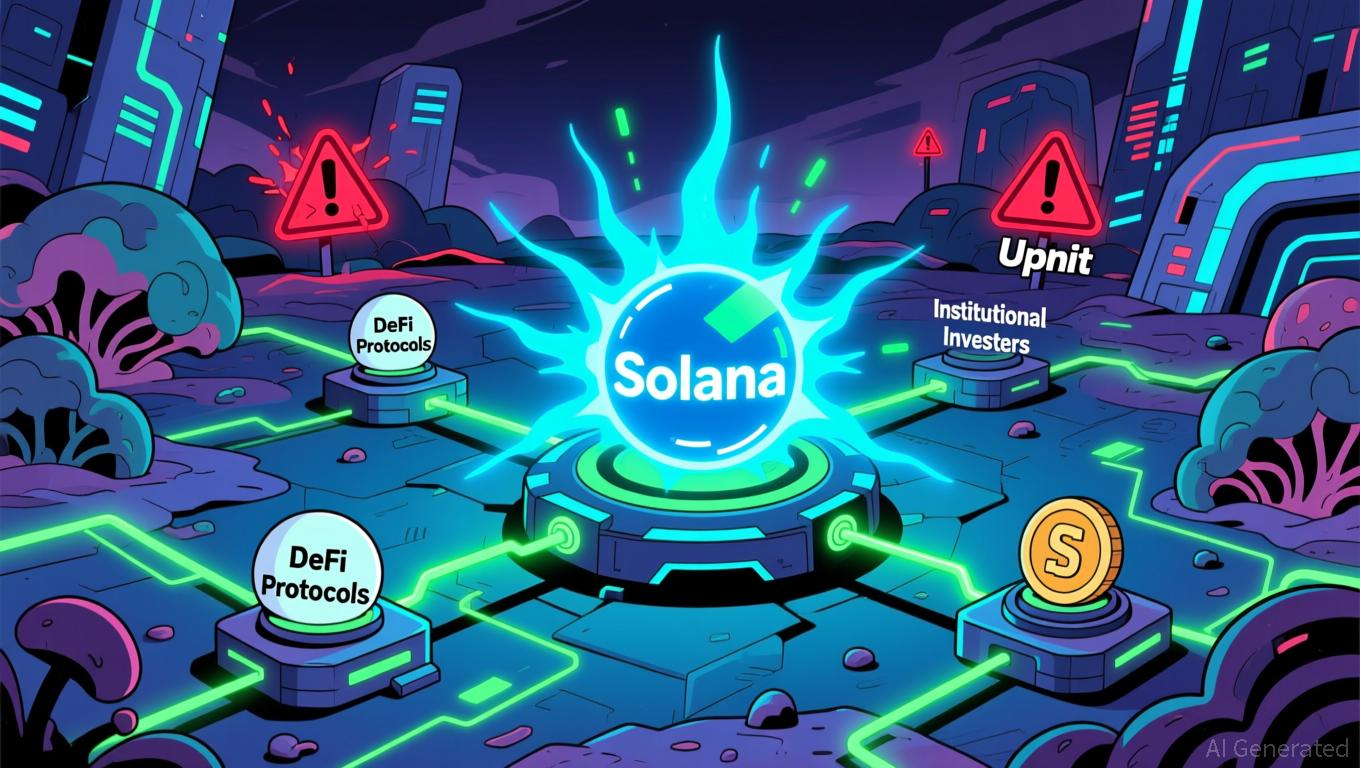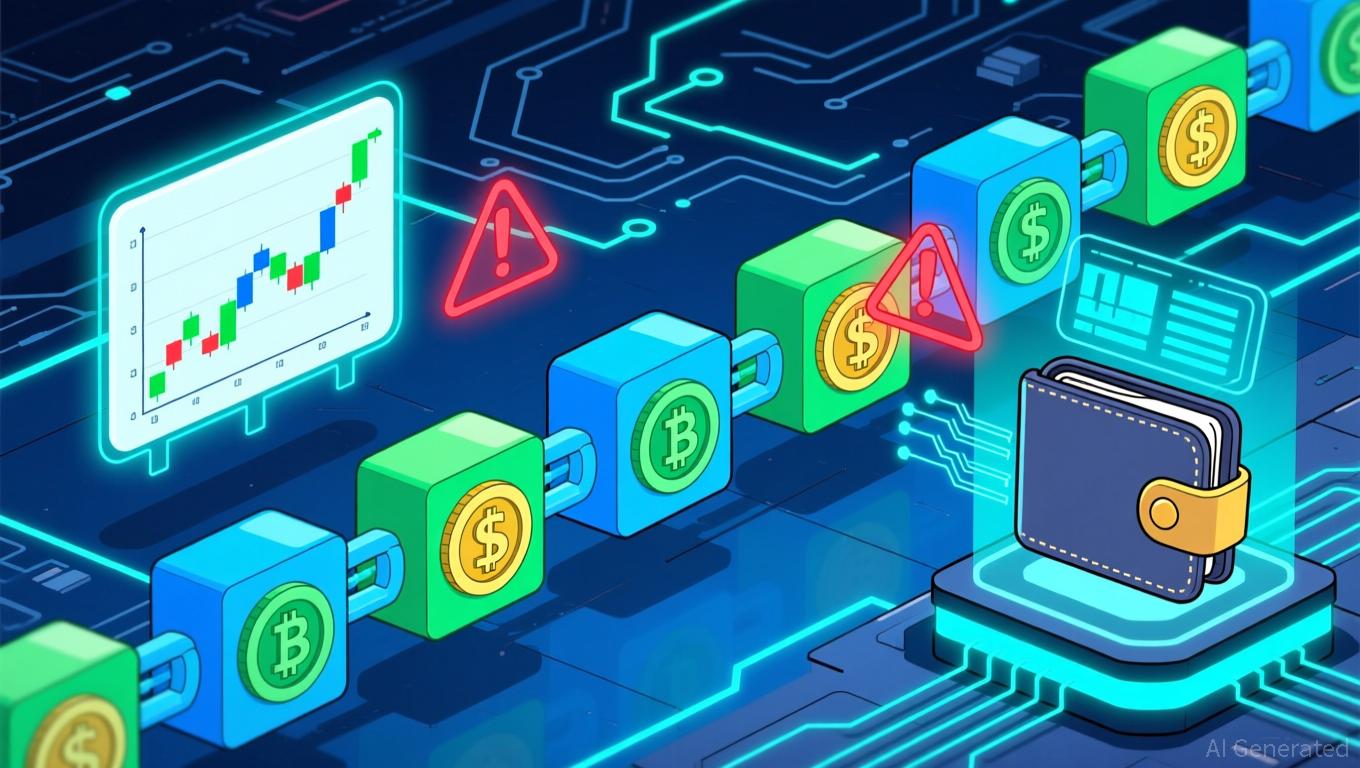Governments Turn to Cryptocurrency as a Practical Defense Against Inflation and Currency Instability
- Bolivia integrates stablecoins into its financial system to combat 22% inflation, ranking 46th globally in crypto adoption after reversing a prior ban. - Regional efforts include Mexico's 314-petaflop AI supercomputer and Brazil's KuCoin-Pix integration, reflecting Latin America's crypto-driven economic strategies. - UAE's Abu Dhabi approves Ripple's RLUSD for institutional use, while Dubai's regulatory advances position the Middle East as a crypto infrastructure hub. - Challenges persist, including Boli
Cryptocurrency Adoption Accelerates Amid Fiat Currency Instability
As inflation undermines the reliability of traditional currencies, both countries and individuals are increasingly turning to cryptocurrencies as alternative financial solutions. Bolivia stands out as a recent example, having integrated stablecoins into its banking sector and now ranking 46th worldwide for crypto adoption. The Bolivian government has authorized banks to provide savings accounts, credit cards, and loans backed by stablecoins, overturning its previous prohibition on such assets.
This policy shift followed a dramatic 530% increase in crypto transaction volumes—from $46.5 million at the start of 2024 to $294 million in the first half of 2025—with total transactions surpassing $15 billion between July 2024 and June 2025. Economy Minister Jose Gabriel Espinoza described the move as a practical response to rising inflation, currency devaluation, and limited access to financial services.
Regional Developments in Digital Finance
Bolivia’s embrace of crypto mirrors broader efforts across Latin America to stabilize economies and modernize financial infrastructure. Mexico, for example, has unveiled plans to construct "Coatlicue," the region’s most powerful supercomputer, boasting 314 petaflops of processing power—making it seven times more capable than Brazil’s current leader. This initiative aims to advance artificial intelligence and data processing capabilities.
In Brazil, the integration of KuCoin Pay with the Pix instant payments system now allows 26 million users to convert cryptocurrencies directly into the Brazilian real, reinforcing Brazil’s leadership in crypto adoption across Latin America.
Global Regulatory Progress and Security Concerns
Regulatory milestones are further legitimizing the crypto sector. Ripple’s RLUSD stablecoin recently received approval for institutional use in Abu Dhabi’s Global Market, a jurisdiction recognized for its rigorous digital asset regulations. Similar approvals in Dubai highlight the Middle East’s growing prominence as a center for crypto innovation.
Despite these advancements, challenges remain. Bolivia’s swift adoption of stablecoins—especially USDT—has sparked debate over the adequacy of regulatory protections, the need for consumer education, and the risks posed by volatility, even for dollar-pegged assets. Security remains a pressing issue, as demonstrated by a recent $36 million breach of Solana hot wallets at South Korea’s Upbit exchange.
Stablecoins as a Hedge Against Inflation
Globally, stablecoins are increasingly viewed as tools to counteract inflation and currency shortages. In Bolivia, both businesses and consumers are now pricing goods in USDT to shield themselves from the declining value of the boliviano. The state-owned energy company YPFB is also considering crypto-based payments for imports. To further support its economic strategy, the Bolivian government has announced $9 billion in multilateral loans, aiming to stabilize an economy grappling with a 22% inflation rate and persistent fiscal deficits.
Looking Ahead: The Need for Strong Regulation and Transparency
While these developments mark significant progress, experts stress that long-term success depends on comprehensive regulation, public awareness, and transparent institutions. As Minister Espinoza remarked, "You cannot control global crypto forces, so embracing them and using them to your advantage is the only realistic path." With Latin America and the Middle East at the forefront, the dynamic between unstable fiat currencies and digital finance is rapidly transforming the global economic landscape.
Disclaimer: The content of this article solely reflects the author's opinion and does not represent the platform in any capacity. This article is not intended to serve as a reference for making investment decisions.
You may also like
Privacy Altcoins Surge While Crypto Markets Decline
In Brief Cryptocurrency markets faced a major downturn in recent weeks. Privacy altcoins like Zcash rise amidst stricter regulation concerns. Upcoming regulations pose liquidity risks for privacy-focused cryptocurrencies.

Solana News Today: Institutions Remain Confident in Solana Amid Security Concerns and Volatile Prices
- Solana's on-chain trading volume now exceeds centralized exchanges, driven by $510M in ETF inflows and institutional adoption of DeFi protocols. - Price volatility and security breaches, including Upbit's $36.8M Solana-based theft, highlight risks despite $3B+ in corporate treasury holdings. - Institutional capital continues to flow into Solana's ecosystem, with DWF Labs committing $75M to scalable DeFi infrastructure amid TVL recovery to $120B. - Forward Industries reports $668M unrealized losses as Sol

XRP News Today: XRP ETFs See Rapid Growth, Price Remains Flat—Will Increased Inflows Overcome Technical Barriers?
- XRP ETFs saw $164M inflows on Nov. 24, 2025, with Grayscale and Franklin Templeton launching new products amid rising institutional interest. - Price rebounded to $2.20 but remains range-bound below key technical levels, forming descending patterns despite ETF-driven liquidity gains. - Ripple's RLUSD stablecoin surged 56% in 30-day volume to $3.5B, now third-largest GENIUS Act-compliant stablecoin after USDC and PYUSD. - Analysts predict $5.05 by 2025 and $26.50 by 2030, but XRP's 16.95% drop from 30-day

SEC Considers Blockchain Stock Advancements as Concerns Over Conventional Market Stability Persist
- SEC plans to discuss tokenized stock regulations with major firms like Coinbase and BlackRock , aiming to modernize securities rules for blockchain-based finance. - Proposed "innovation exemption" seeks to fast-track crypto products but risks destabilizing traditional markets by creating valuation gaps and eroding investor protections. - WFE warns tokenized shares could disrupt market structure, while Nasdaq proposes unified order books with shared CUSIP identifiers to align with existing systems. - Regu
